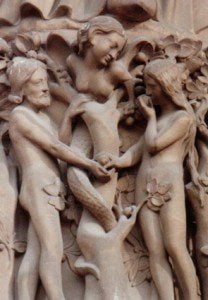 In the last post on Four Views on the Historical Adam we looked at the view of Adam put forth by C. John Collins. He takes an old earth special creation view, but is willing to consider a wide range of scenarios that fit within certain limits. For example, an old earth and an evolutionary description of the diversity of animal life poses no theological problems if this is where the scientific evidence leads. However, he does not think humans can be fit neatly into an evolutionary picture, scientifically or theologically. Scientifically he feels that “it is simply unreasonable to suppose that one can arrive at human capacities without some “help” from outside” and theologically that it fails to account for human distinctiveness as the image of God.
In the last post on Four Views on the Historical Adam we looked at the view of Adam put forth by C. John Collins. He takes an old earth special creation view, but is willing to consider a wide range of scenarios that fit within certain limits. For example, an old earth and an evolutionary description of the diversity of animal life poses no theological problems if this is where the scientific evidence leads. However, he does not think humans can be fit neatly into an evolutionary picture, scientifically or theologically. Scientifically he feels that “it is simply unreasonable to suppose that one can arrive at human capacities without some “help” from outside” and theologically that it fails to account for human distinctiveness as the image of God.
Denis Lamoureux has a great deal of respect for Jack Collins as a fellow Christian but disagrees with his position on four major points. First, he agrees with Collins on the big story of scripture, but doesn’t feel that this requires a historical Adam. Collins has asserted this as a foundation, but doesn’t really make the case in a convincing manner.
Second, Lamoureux thinks that Collins falls into the trap of scientific concordism. Although Collins is willing to consider figurative and imaginative elements in the text, he feels that the text must relate an account of human origins that is in agreement with the historical events. In Lamoureux’s view this amounts to scientific concordism.
Third, Collins wanders into God-of-the-gaps thinking when he asserts that the complexity of human uniqueness must require divine intervention. Such features as language, art, and a craving for community are not as discontinuous with the other animals as Collins supposes. There is good evidence for roots of some of these in the evolution of mammals and especially primates, and the absence of a complete picture does not mean that there is no “natural” explanation – of God, but not requiring special supernatural intervention.
Finally Lamoureux feels that Collins is somewhat arbitrary in the passages of Genesis 1-11 that he sees as historical and those he sees as figurative or imaginative.
John Walton also has a great deal of respect for Jack Collins. John and Jack are fairly close in their overall interpretation, but disagree on a few points. Walton sees the most significant disagreement as one involving the overall approach to Genesis 1-11. While Collins spends a good deal of effort focused on how people today think about history and science, etc. Walton thinks that the focus needs to be on getting inside the mind of the ancient Near Eastern author and audience. We need to think outside our 21st (…18th, 19th, 20th) century box to understand what they intended to convey in the text we have.
Walton agrees with Collins that the bible conveys a universal impact of sin, but doesn’t think that Collins made the case that this requires a unified origin of humanity descended from Adam and Eve (as unique progenitors or as chief of a smallish group). In Walton’s view Collins makes a strong case for the historicity of the fall, but not for material human origins.
William Barrick takes a young earth view of creation. He feels that Denis, John, and Jack all fail to take scripture as the authority it is meant to be. In Barrick’s view Collins is right to stress the importance of historicity, but fails to realize that accuracy in detail is an important component of this and that lack of accuracy is a weakness that invites counterattack – in the ancient Near East and today. Collins appeals to the readers intuition to distinguish between the intent of Genesis 1-11 and Genesis 12-50. Barrick thinks that this is too subjective and “leaves the door open for too many unacceptable options.” (p. 189) He asserts that “the Hebrews worldview does not give them the freedom to mythologize history the way the ancient Mesopotamians did” (p. 189) and that “Genesis 1-11 set out to record events exactly as they happened.” (p. 190) Barrick sees the formula phrase “and it was so” as intending to convey this precise historicity in the Genesis 1 account of creation. A “very good” creation is not, in his view, consistent with millions of years of death and disease. He concludes:
The old-earth view yields to the opinions of evolutionary scientists about the age of the earth and about the process of evolution – just like the views presented by Lamoureux and Walton. It boils down to the acceptance of an authority outside the Bible – a dominantly secular authority often very antagonistic to the biblical record – to force the account in Genesis 1-11 to conform to that external authority. The young earth view does not accept reinterpreting the Scriptures to force it into an evolutionary mold. (p. 191)
Jack Collins offers a rejoinder to the comments by Lamoureux, Walton, and Barrick. He feels that Lamoureux is misinterpreting him when claiming that he is guilty of scientific concordism or God-of-the-gaps reasoning from an absence of knowledge. We expect historical concordance in scripture, not scientific concordance. His view of the special creation of Adam and Eve does not rest on the expectation of scientific concordance with scripture, but on theological and philosophical grounds. He also appeals to the presence of different kinds of gaps in knowledge. As Christians we affirm that the resurrection was supernatural because of the very nature of the event. Collins feels that the path from molecule to mankind is also the kind of event that requires supernatural intervention on philosophical grounds, not on the grounds of an absence of scientific knowledge.
Collins doesn’t have much to say in response to Barrick or Walton. He finds the claim that his view is formed because of the acceptance of external authority (science) to be a dead end. The only way forward is to deal with the substance of arguments. He and Walton agree on most things and their disagreement on Adam and Eve has already been elaborated in each essay and in his response to Walton’s essay.
And some comments of my own. I think that Lamoureux is misinterpreting Collins when he accuses him of scientific concordism. I do think that the assumptions that Collins brings to scripture require more historical concordance than is warranted. This doesn’t come up much in the current essay, but was made more explicit in his book Did Adam and Eve Really Exist?: Who They Were and Why You Should Care. The way Collins describes the need for supernatural intervention in the creation of mankind does strike me as God-of-the-gaps reasoning. This was also discussed in my recent post Fairness Tastes Like Ice Cream, where one of the commenters with more expertise than I provided links elaborating the reasons why the difference are more ones of degree than kind.
But ultimately the reasons Collins upholds some form of special creation and a historical and unique pair are more theological than scientific, or even hermeneutical (dependent on the view of scripture). This is where it is most profitable to focus the discussion.
Over the last few years I have to say that I have become less than convinced that the Bible intends, anywhere, to portray the origin of sin. We don’t know why, for example, the snake is in the garden trying to corrupt Eve and thus Adam also. Rebellion began before Adam. That sin enters the human line with an original pair simply doesn’t seem to be the point in either the Old or New Testaments. On the other hand, the Bible clearly portrays the universal impact of sin and the places the blame firmly on mankind as a species, as communities, and as individuals. Rebellion is the point. We are formed to need God, to be in fellowship with God. But this relationship, like our other relationships, is broken. Broken by us, not by God. Broken time and time again.
I am not convinced by Collins’s arguments for a unique historical Adam because I am not convinced that Adam is theologically important in the story line of Scripture.
How would you respond to the idea of humans as special creation?
Is Collins guilty of scientific concordism and God-of-the-gaps reasoning?
Is Adam theologically significant?
If you wish to contact me directly you may do so at rjs4mail [at] att.net.
If interested you can subscribe to a full text feed of my posts at Musings on Science and Theology.











